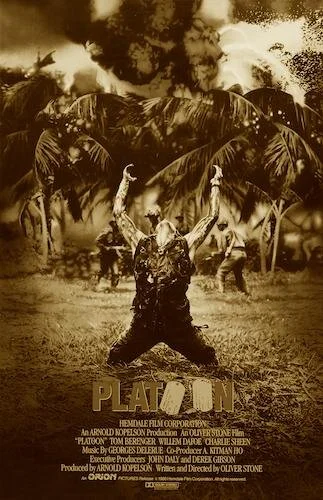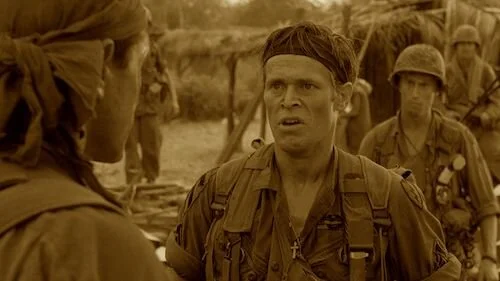Platoon
This review is a part of the Best Picture Project: a review of every single Academy Award winner for the Best Picture category. Platoon is the fifty ninth Best Picture winner at the 1986 Academy Awards.
I have never been a major fan of Oliver Stone's works. His films often feel like excessive amounts of excess (yes, that redundantly excessive). If there was ever a film of his that was meant to be titled the best picture of the year, it had to be Platoon. Luckily, that's exactly the film that won Best Picture at the Academy Awards. By this point, Platoon hardly felt like the edgiest film to be nominated or awarded by the Academy. That was hardly the point, and it's a major reason why this is unquestionably Stone's finest hour. Platoon is rough, yes, but it puts all of its focus on showing the Vietnam War, rather than trying to particularly spook or entice audiences like other Stone works.
It's funny, because Platoon's legacy is often represented by moments. “Adagio for Strings” has become a pop culture tune, more-so than just being Samuel Barber's melody. The image of Sergeant Grodin reaching for the skies is the most referenced symbol regarding the film. The zeitgeist surrounding Platoon is anchored by only a few recognizable elements, enough to imply that the film may only have a few tricks up its sleeve. It's strange, because watching Platoon disproves all of that. You may be wondering why the rest of the film isn't nearly as honoured in the annals of '80s nostalgia. Platoon is absolutely strong through and through, and you will discover that if you have not watched it yet.
The shot compositions in Platoon are beyond captivating, and the entire film becomes a candid work of art.
To entice you, let me give the brief skinny. The titular platoon dropped in the middle of the Vietnam War experiences a schism once militant minds begin to fragment. Private Taylor is caught in the midst of this divide, as he sees two sergeants go at each other's throats, then start their own followings within the platoon. These soldiers are now worrying about each other, and not just their enemy. That's your focal point being shifted as well, as the viewer. Camaraderie begins to dissipate. Like a mixture of Mutiny on the Bounty and All Quiet on the Western Front, Platoon is the mission young soldiers didn’t know they signed up for, plus the fragility of a cooperating troop that can turn in on itself at any given moment.
Towards the end, Platoon becomes a near-psychological thriller, with bloodshed everywhere, and minds warping beyond repair. Stone loves to try and scrunch out every last drop of danger in his films (as a director or writer), but here the effort feels warranted. Rather than trying to be a statement from the start, Platoon slowly burns its way towards the final result. Stone fought in the Vietnam War for a few months, so his perspective was always understood. With Platoon, he took his time to write a well crafted essay, whereas he usually leaps towards the main argument and belts this idea out for an entire duration of a film. As a result, the final moments of Platoon are harrowing. You have no idea who will make it out alive, or what exactly will happen. You grow delirious like the characters on screen.
The dissolving of trust within the primary platoon transforms the film’s mission gradually. Fellow soldiers have to start surviving each other as the story continues onward.
I’ve been quite harsh on Oliver Stone, but Platoon is a big reason why. I understand why Stone relies on shock and conspiratorial intrigue to pace his films, but we have clear-as-day evidence that he can flesh out an entire work that doesn’t rely on the shallow qualities of political filmmaking. There are many war films (in case that wasn’t painfully obvious), and it’s hard to stand out. Platoon is a considerable effort because of how much it tries to show the problems with war without being a strictly anti-war film (all things considered). Despite the monstrous actions on screen, you know Stone appreciates those that do defend their countries, even though he is pointing out all of the problems with being in action. Platoon is not an answer, but rather an account by one that has been in battle. It is easily Stone’s most fully realized film, and a notable entry in the Vietnam War film genre.
Andreas Babiolakis has a Masters degree in Film and Photography Preservation and Collections Management from Ryerson University, as well as a Bachelors degree in Cinema Studies from York University. His favourite times of year are the Criterion Collection flash sales and the annual Toronto International Film Festival.







